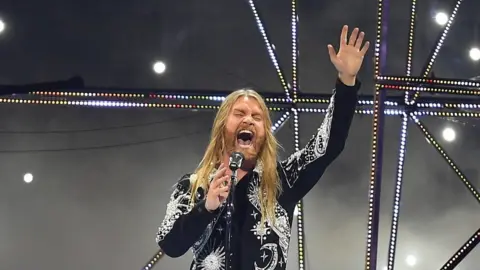Eurovision scraps jury voting in semi-finals
 Reuters
ReutersThe Eurovision Song Contest has announced major changes to the voting process at next year's contest.
Professional juries have been scrapped from the semi-finals, meaning that viewers alone will choose who qualifies for the grand final.
Countries who are not competing in the contest will also be allowed to cast votes for the first time.
The move comes after it was discovered that six juries traded votes at this year's contest in Turin, Italy.
Irregular voting patterns were detected from Azerbaijan, Georgia, Montenegro, Poland, Romania and San Marino, said the EBU, which organises the contest.
Those jury votes were discounted, and substituted with an aggregate score, calculated from the results of other countries with similar voting records.
In the end, the contest was won by Ukraine's Kalush Orchestra, with the UK's Sam Ryder taking second place.
Liverpool will host the event in 2023.
Professional juries, which comprise professional songwriters and music industry figures, have existed since at least the second Eurovision Song Contest in 1957 (the voting system for the first competition has never been revealed).
Under the current system, their scores are combined with the results of a public vote to determine the overall winner.
This practice will continue in the final, said the EBU in a press release.
TV presenter Nicki Chapman, who has served on the UK jury twice, welcomed the change, saying fans often know more than the professionals.
"There'll be lots of people breathing a sigh of relief, because real Eurovision fans are online months and months in advance. They know every single song, and they'll have their favourites.
"So when Ireland gets knocked out, for example, so many people are disappointed. This [change] gives everybody the chance to put their favourite through and, when it comes to the final, the juries will have 50% of the votes."
 Reuters
ReutersAllowing non-participating countries to vote will reflect "the global impact of the event," said Martin Österdahl, the contest's executive supervisor.
"Everyone watching the show, wherever they live in the world, can cast their votes for their favourite songs."
Online votes from the "rest of the world" will be added together and converted to points that will have the same weight as one participating country in both of the semi-finals and the grand final, the EBU said.
"I love the idea it's going to go global," said Chapman, who worked with David Bowie, the Spice Girls and Amy Winehouse before moving into television.
"I wonder whether, say an artist such as Adele might suddenly think, 'Actually, I want to be part of this. This goes out to a global audience, I want to represent the UK'. Wouldn't that be wonderful?"
In the past, Eurovision viewers have frequently voted in opposition to the juries. This year,for example, Ukraine overwhelmingly won the tele-vote at the final, scoring 439 points, but came fourth in the jury vote, with 192.
Sam Ryder, meanwhile, was the jury members' favourite act, scoring 283 points, but came fifth with viewers at home.
Thirty-seven countries will take place in next year's contest, with Montenegro and North Macedonia pulling out due to the cost of participating.
Russia was expelled from this year's event after its invasion of Ukraine; and its suspension will continue in 2023.

Follow us on Facebook or on Twitter @BBCNewsEnts. If you have a story suggestion email [email protected].
